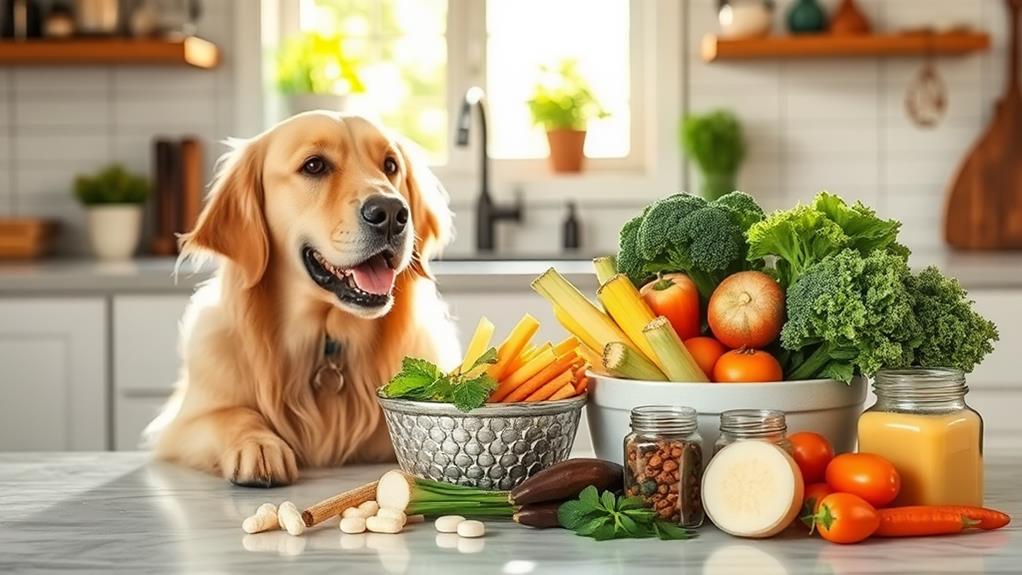Senior dogs need a well-rounded diet that includes high-quality protein, healthy fats, essential vitamins, and minerals. Aim for 25-30% of their daily calories from easily digestible protein sources like chicken, fish, and beef. Healthy fats, particularly omega-3 and omega-6, support skin, coat, and joint health. Don't forget fiber to aid digestion and maintain a healthy weight. Key vitamins like A, D, E, and B support various functions, while minerals like calcium and zinc strengthen bones and boost immunity. Keeping your senior dog hydrated is indispensable, too. There's more to explore about tailoring their diet to meet unique needs.
Importance of Nutrients

As your dog ages, the importance of nutrients becomes increasingly crucial for their overall health and well-being. Senior dogs face different health challenges compared to their younger counterparts, and the right balance of nutrients can make a significant difference in their quality of life. You might notice that your dog's energy levels drop or that they become more prone to health issues, which is where proper nutrition comes into play.
Essential vitamins and minerals help support your dog's immune system, keeping them healthier and more resilient against illnesses. Antioxidants, for instance, combat oxidative stress, which can lead to age-related diseases. Furthermore, maintaining a proper balance of fats supports skin health and keeps their coat shiny.
You should also pay attention to fiber, as it aids digestion and helps prevent obesity—a common concern in older dogs. By providing a well-rounded diet rich in nutrients, you can help your dog maintain optimal weight, support their joints, and promote overall vigour. Regularly consulting with your vet about your dog's nutritional needs guarantees they receive everything required for a happy, healthy life in their golden years.
Protein Requirements
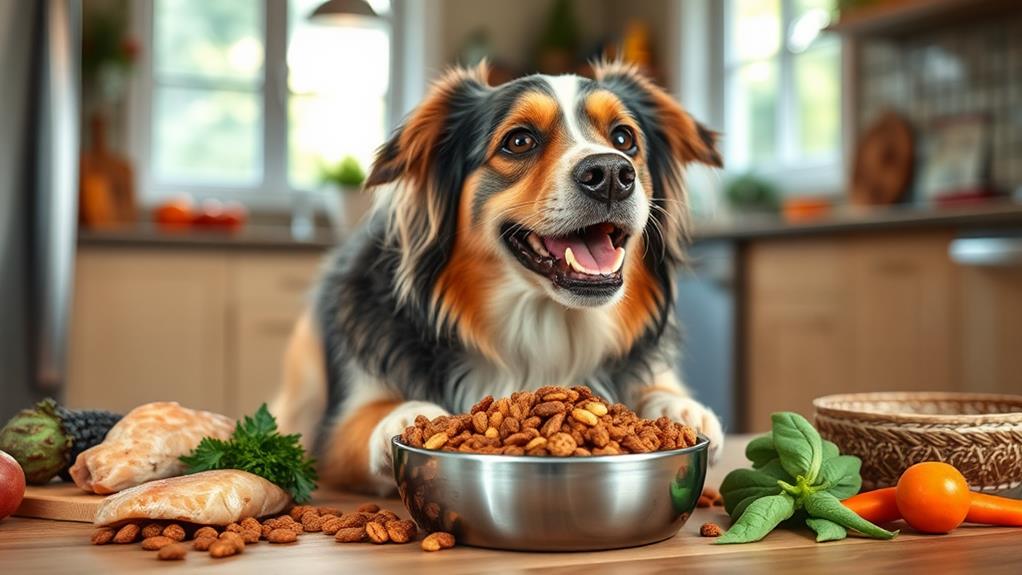
While it's easy to overlook, the protein requirements of senior dogs are essential for maintaining their muscle mass and overall health. As dogs age, their ability to absorb and utilize protein decreases, making it vital to provide them with the right amount of high-quality protein.
Choose high-quality protein sources like chicken, fish, or beef. These provide essential amino acids that support muscle health.
Senior dogs typically require about 25-30% of their daily calories from protein. Adjust based on your dog's activity level and weight.
Opt for easily digestible proteins. Senior dogs may struggle with processing certain proteins, so look for those specifically formulated for older dogs.
Always consult your veterinarian to tailor your senior dog's diet. They can provide personalized advice based on your dog's health status and nutritional needs.
Healthy Fats
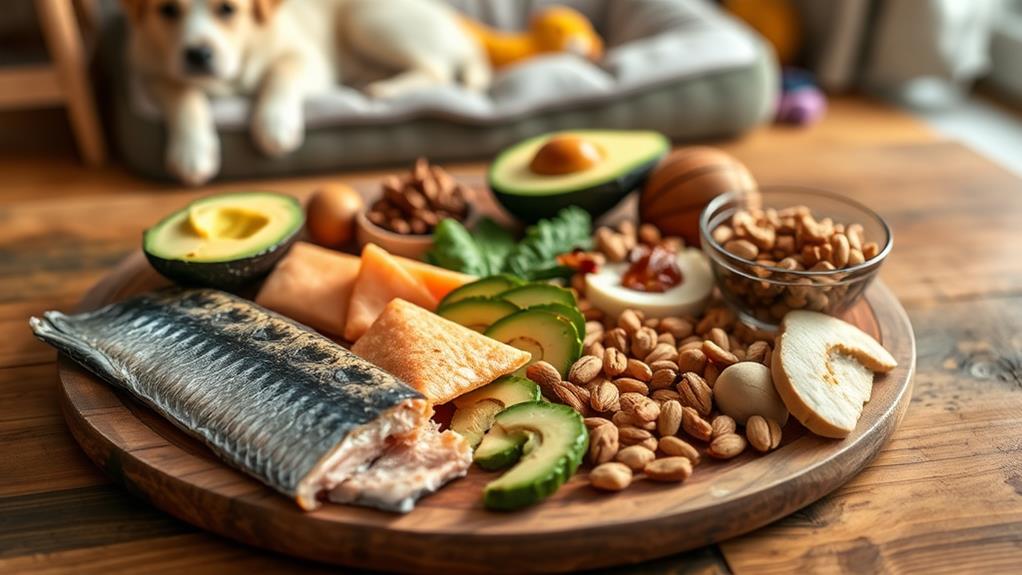
After ensuring your senior dog gets enough protein, it's important to focus on healthy fats, which play an integral role in their diet. Healthy fats provide essential fatty acids that support their skin and coat health, keeping them shiny and reducing dryness. These fats also help maintain healthy joints, which is especially important for older dogs that may experience arthritis or mobility issues.
Incorporating sources of healthy fats, such as fish oil, flaxseed oil, and chicken fat, can boost their energy levels and improve overall vigor. Omega-3 and Omega-6 fatty acids found in these fats can also help combat inflammation, which is beneficial for senior dogs suffering from various age-related conditions.
When adding healthy fats to your dog's diet, moderation is key. Too many fats can lead to obesity, which poses further health risks. Aim for a balanced diet that incorporates the right amount of healthy fats alongside protein and carbohydrates.
Always consult your veterinarian before making significant changes to your dog's diet. They can guide you in determining the right balance of healthy fats tailored to your senior dog's unique needs.
Essential Vitamins
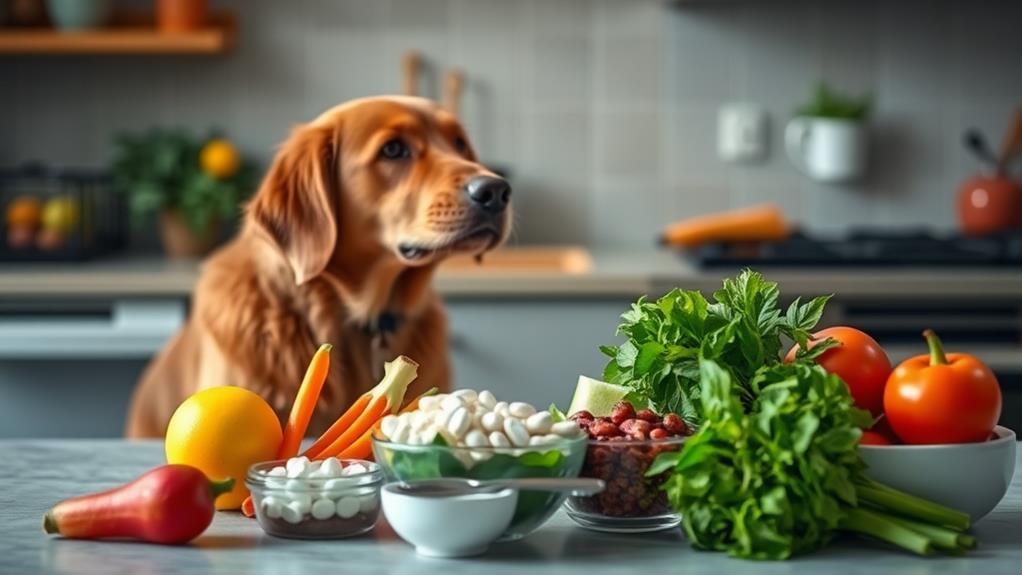
Indispensable vitamins are critical for maintaining your senior dog's health and well-being. As your furry friend ages, their nutritional requirements change, and ensuring they get the right vitamins can make a significant difference in their quality of life.
Vitamin A: Important for vision, immune function, and skin health. It helps keep your dog's coat shiny and their eyes bright.
Vitamin D: Indispensable for calcium absorption and bone health. This vitamin plays a role in maintaining strong bones, which is especially important for older dogs.
Vitamin E: A necessary antioxidant that helps combat oxidative stress and supports immune function. It can also promote healthy skin and coat.
B Vitamins: This group includes B1 (thiamine), B2 (riboflavin), B6 (pyridoxine), and B12 (cobalamin), which are essential for energy metabolism, brain function, and red blood cell production.
Incorporating these vitamins into your senior dog's diet can help guarantee they stay healthy and vibrant as they age. Always consult with your veterinarian before making any dietary changes.
Key Minerals
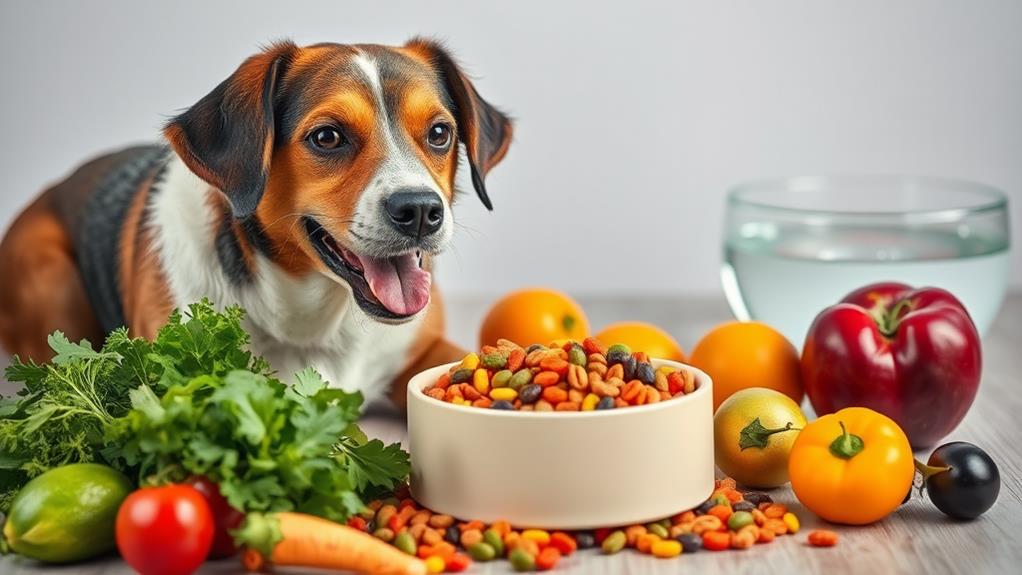
Minerals play an essential role in your senior dog's overall health and well-being. These nutrients are indispensable for various bodily functions, including bone health, nerve function, and muscle contractions.
Calcium and phosphorus are particularly important for maintaining strong bones and teeth, especially as your dog ages. An imbalance in these minerals can lead to skeletal problems, so make certain they're present in your dog's diet.
Magnesium is another pivotal mineral that supports muscle function and energy production. A deficiency can result in muscle weakness or seizures, so monitor your dog's intake carefully. Potassium is key for maintaining fluid balance and proper muscle function, while sodium helps regulate blood pressure and maintain hydration levels.
Zinc and iron should also be part of your senior dog's diet. Zinc supports a healthy immune system and skin, while iron is necessary for transporting oxygen in the blood.
Always consult your veterinarian when adjusting your senior dog's diet. They can help you determine the right mineral balance based on your dog's specific needs. Providing your dog with a well-rounded diet rich in essential minerals will help keep them healthy and active in their golden years.
Fiber and Digestion
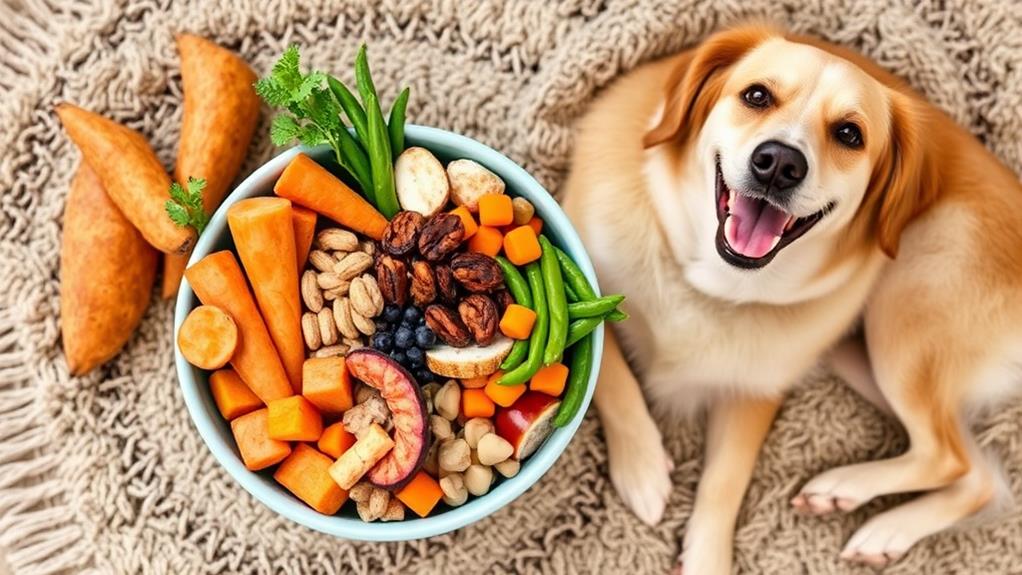
A well-balanced diet for senior dogs includes adequate fiber, which is pivotal for healthy digestion. Fiber helps regulate your dog's bowel movements and can prevent constipation, a common issue in older dogs. Additionally, it promotes a healthy gut microbiome, which is essential for overall health.
When choosing a diet for your senior dog, consider these fiber sources:
- Vegetables: Carrots, green beans, and sweet potatoes are fantastic options that provide fiber along with essential vitamins.
- Fruits: Apples (without seeds), blueberries, and pumpkin aren't only fiber-rich but also delicious treats for your furry friend.
- Whole Grains: Brown rice, oats, and barley can offer a good source of soluble fiber, aiding in digestion.
- Legumes: Lentils and peas are high in fiber and can be a great addition to your dog's meals.
Incorporating these fiber sources into your senior dog's diet can enhance their digestive health, helping them stay comfortable and active as they age. Always remember to introduce any new food gradually to avoid upsetting their stomach.
Hydration Needs

Maintaining proper hydration is pivotal for your senior dog's overall health and well-being. As dogs age, their thirst drive may diminish, making it crucial for you to monitor their water intake closely. Dehydration can lead to serious health issues, including kidney problems, urinary tract infections, and even lethargy.
To keep your senior pup hydrated, provide fresh water daily and make sure their bowl is always filled. Some dogs prefer running water, so consider investing in a pet water fountain. You might also notice your dog enjoys wet food or broth, which can help increase their fluid intake.
Pay attention to their daily routines and habits; if they're drinking less than usual, it might indicate a health issue that needs addressing. If your dog shows signs of dehydration—such as dry gums, loss of skin elasticity, or a decrease in energy—contact your veterinarian.
It is crucial to keep an eye on the temperature, as hot weather can increase their hydration needs. By staying proactive about your senior dog's hydration, you'll support their overall health and help them maintain a happy, active lifestyle.
Tailoring Diets for Senior Dogs
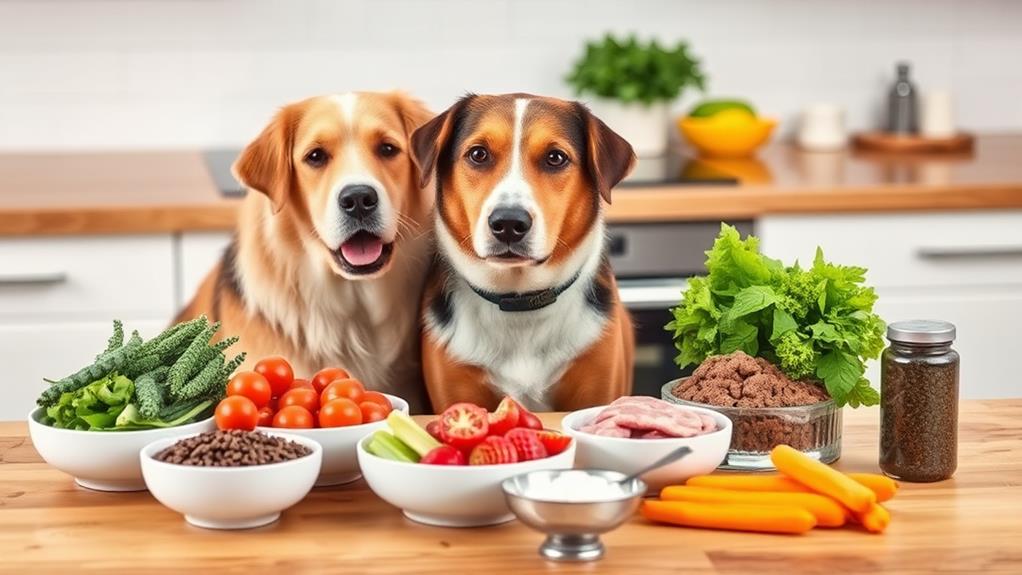
Tailoring diets for senior dogs involves understanding their unique nutritional needs as they age. As your furry friend grows older, their metabolism slows down, and their dietary requirements change. To guarantee they stay healthy and happy, consider the following key adjustments:
- Protein: Increase high-quality protein to help maintain muscle mass. Look for sources like chicken, turkey, and fish.
- Fiber: Include more fiber to aid digestion and prevent constipation. Ingredients like pumpkin or sweet potatoes can be beneficial.
- Fats: Opt for healthy fats, such as omega-3 fatty acids, to support joint health and reduce inflammation. Fish oil or flaxseed oil works great.
- Vitamins and Minerals: Supplement with essential vitamins, particularly antioxidants like vitamin E and C, to bolster the immune system.
Frequently Asked Questions
How Do I Transition My Senior Dog to a New Diet?
To migrate your senior dog to a new diet, start by gradually blending the new food with the old. Increase the new food portion over a week, monitoring your dog's response to avoid digestive issues.
Are There Any Specific Foods to Avoid for Senior Dogs?
While some foods boost health, others harm. Avoid high-fat treats, artificial additives, and excessive salt. As your senior dog ages, prioritize fresh, wholesome ingredients to keep them happy and thriving. You'll notice the difference!
Can Senior Dogs Benefit From Supplements?
Yes, senior dogs can benefit from supplements. They often need additional support for joint health, digestion, and overall essence. Consult your vet to find the right supplements tailored to your dog's specific needs and lifestyle.
How Often Should I Feed My Senior Dog?
You might worry about overfeeding, but it's essential to feed your senior dog two to three smaller meals daily. This helps maintain energy levels, supports digestion, and keeps their weight in check as they age.
What Are Signs My Senior Dog Needs a Dietary Change?
If your senior dog's energy drops, weight changes, or coat becomes dull, it might be time for a dietary change. Also, watch for digestive issues or increased thirst, as these can indicate nutritional needs shifting.
Conclusion
Fundamentally, ensuring your senior dog gets the right nutrients is vital for their health and happiness. Did you know that about 50% of dogs over the age of 10 are considered overweight? By focusing on lean proteins, healthy fats, essential vitamins, and minerals, you can help maintain a healthy weight and support their overall well-being. Tailoring their diet to meet their specific needs can keep them active and energetic well into their golden years!

